May 21, 2025 | 05:39 GMT +7
May 21, 2025 | 05:39 GMT +7
Hotline: 0913.378.918
May 21, 2025 | 05:39 GMT +7
Hotline: 0913.378.918
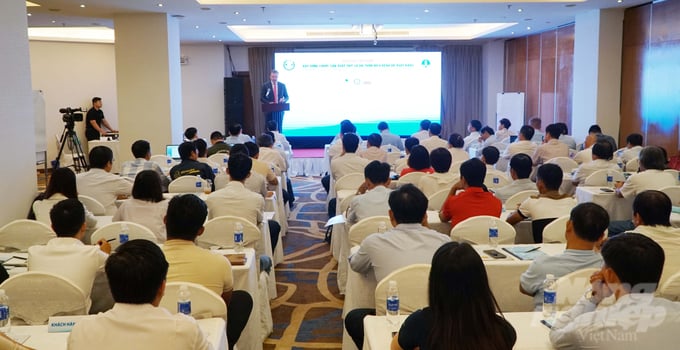
The training program attracted representatives of the Department of Animal Husbandry and Veterinary Medicine from many localities, along with poultry farming enterprises in the Southeast region. Photo: Le Binh.
This week in Dong Nai, the Department of Animal Health, the Vietnam Agriculture Newspaper, and De Heus Co., Ltd. organized a training program with the title "Building disease-safe poultry production chains for export." In accordance with the conclusions and directives of Phung Duc Tien, Deputy Minister of Agriculture and Rural Development, this training session sought to implement plans to increase exports of livestock products in the near future.
In recent years, poultry rearing has been essential to the expansion of the agricultural economy. The expansion of the poultry and veterinary industries has allowed Vietnam to satisfy the daily dietary requirements of its 100 million citizens.
According to Mr. Phan Quang Minh, Deputy Director of the Department of Animal Health (Ministry of Agriculture and Rural Development), the country will have over 550 million poultry and over 17 billion eggs by the end of the first half of 2023. This guarantees a substantial supply for domestic consumption as well as the possibility of meeting export demand. However, the quantity and value of poultry product exports are still relatively low, and there is a danger of domestic underperformance.
Vietnam's exports of animals and animal products, including poultry, to other nations are still quite minimal, reaching just over USD 400 million annually.
Signed free trade agreements have led to an increase in the importation of animal products from other nations into Vietnam.
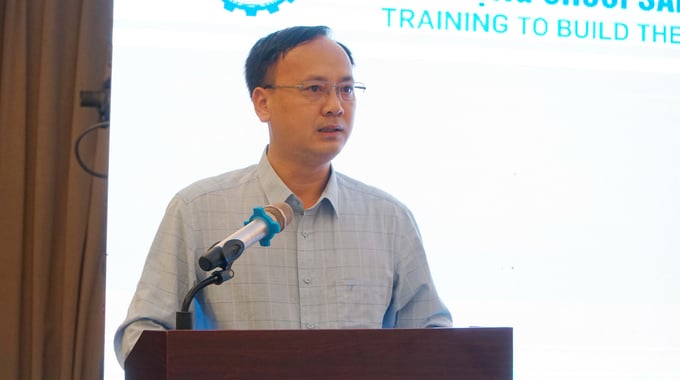
Mr. Phan Quang Minh, Deputy Director of the Department of Animal Health. Photo: Le Binh.
"One of the primary reasons Vietnam has not been able to export many animal products is due to domestic livestock maladies. Vietnam is not yet designated a disease-free nation, as there are no disease-free farming zones that meet the requirements of the World Organisation for Animal Health (OIE), and we have not completely met the import requirements of other nations, according to Mr. Phan Quang Minh.
According to Mr. Le Trong Dam, Deputy Editor-in-Chief of the Vietnam Agriculture Newspaper, despite the government's, Ministry of Agriculture and Rural Development's, and Department of Animal Health's strong emphasis on planning and establishing disease-safe zones, businesses and poultry farmers remain uninterested.
Mr. Dam believes that if we do not strengthen poultry meat and egg exports, there is a substantial risk that Vietnam's livestock sector will experience a "trade backlash," with imports returning to Vietnam.
To genuinely develop disease-free poultry farming, Mr. Dam suggests an ecosystem comprised of businesses, farms, cooperatives, farmers, and the contemporary role of the 4.0 technology era, which emphasizes the role of media organizations.
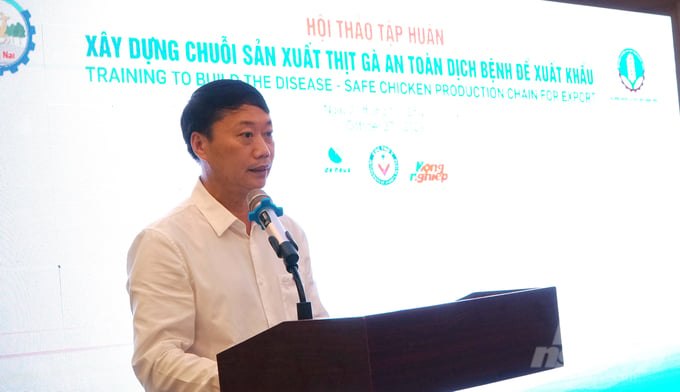
Mr. Le Trong Dam: "Vietnam Agriculture Newspaper will be a bridge and join hands with managers, businesses, and breeders to build an effective and sustainable development of Vietnam's livestock industry." Photo: Le Binh.
Businesses should provide leadership and serve as models for poultry producers, encouraging them to learn and expand their export markets.
Despite its limited land area and population, the agricultural history of the Netherlands can teach Vietnam valuable lessons regarding agricultural exports, particularly poultry products.
Mr. Johan van den Ban, the chief executive officer of De Heus Co., Ltd., believes Vietnam has favorable conditions for exporting agricultural products, especially poultry. The Netherlands, a small country with a low population, has maintained its position as the world's second-largest exporter of agricultural products (behind only the United States) for many years. To attain promising results, Vietnam should implement agricultural practices and stringent regulations.
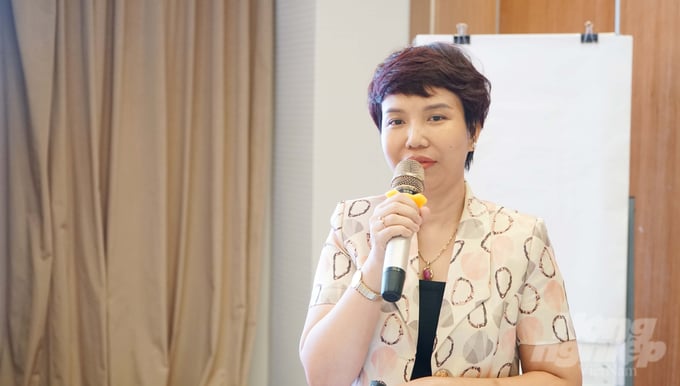
Ms. Nguyen Thi Diep, Head of Epidemiology, Department of Animal Health shared the requirements and regulations of some countries around the world on disease-free facilities and zones when agreeing to import animals and animal products. Photo: Le Binh.
Currently, Vietnam has effectively negotiated in the field of veterinary medicine, permitting the export of animals and animal products with a total value of more than $400 million USD to 40 countries and territories. Notable export destinations for processed poultry meat include Japan, Hong Kong, the Russian Federation, and five European nations.
Vietnam exports approximately 5,000 tons of animal products annually on average, contributing considerably to the livestock industry's aggregate export revenue of over $1.5 billion USD.
Mr. Johan van den Ban asserts that the livestock industry's future prospects are even brighter in light of Vietnam's poultry breeding capabilities and its accelerated rate of adaptation.
In terms of attracting foreign direct investment (FDI) in poultry production, Vietnam is becoming a focal point. Vietnam has more land allocated for poultry husbandry than other countries in the region, and its production costs are also lower. Moreover, numerous companies are investing aggressively in Vietnam's production lines and the supply of strains, feed, and other commodities. De Heus will invest in a professional poultry processing facility and a hatchery in Vietnam in 2024, for example.
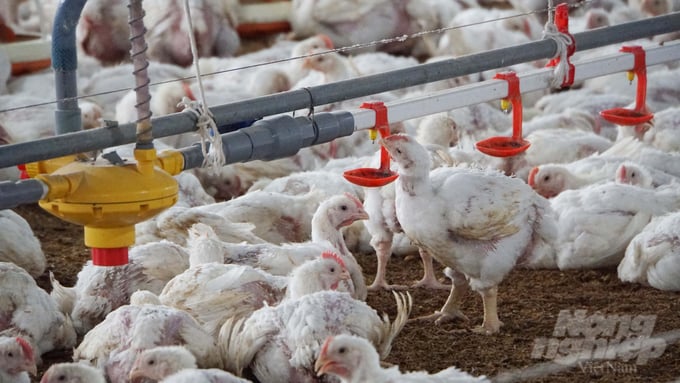
Businesses and breeders are gradually becoming more aware of chicken farming associated with disease safety. Photo: Le Binh.
However, this opportunity also presents challenges that the Vietnamese poultry industry must address collectively. "Without the cooperation of the populace, businesses will be cut off. Mr. Phan Quang Minh stated that we will not accomplish much if disease safety measures are not implemented and put into practice. To meet both domestic and export demands, the Vietnamese livestock and veterinary sectors are determined to assure disease-free livestock, particularly in the poultry industry.
Translated by Linh Linh

(VAN) Dong Thap farmers attained an average profit margin of 64% during the summer-autumn 2024 crop (first season), while An Giang and Kien Giang farmers followed with 56% and 54%, respectively.

(VAN) As a doctoral student doing research on renewable energy and electrification at Harvard University, the author shares his musings on electricity, nature, and countryside memories.

(VAN) The decree on Extended Producer Responsibility (EPR) ensures transparent management and disbursement of support funds, avoiding the creation of a “give-and-take” mechanism.

(VAN) Hue City rigorously enforces regulations regarding marine fishing and resource exploitation, with a particular emphasis on the monitoring of fishing vessels to prevent illegal, unreported, and unregulated (IUU) fishing.

(VAN) Hanoi People's Committee has issued a plan on reducing greenhouse gas emissions in the waste management sector with 2030 vision.

(VAN) Vietnam's draft amendment to Decree No. 156 proposes a mechanism for medicinal herb farming under forest canopies, linking economic development to population retention and the sustainable protection and development of forests.

(VAN) In reality, many craft village models combined with tourism in Son La have proven effective, bringing significant economic benefits to rural communities.